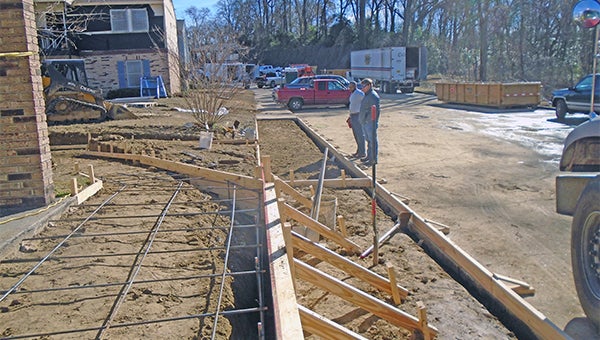Housing Authority has begun major renovations
Published 5:54 pm Saturday, February 17, 2018
There’s a lot of work going on at the Vicksburg Housing Authority’s Urban Court property off Monroe Street.
Construction crews are pulling out air conditioning vents and thermostats, appliances and fixtures and pulling up floors to make way for renovations to the property’s 27 units.
The work is part of a 15-phase, $50.353 million program to renovate and upgrade all of VHA’s 430 housing units as the housing authority converts its properties from public housing to Section 8 under the U.S. Department of Housing and Urban Development’s Rental Assistance Demonstration Program.
The RAD Program, as it is called, is geared to move housing from public housing to Section 8 so structures can be brought up to HUD standards.
A Section 8 program allows private landlords to rent apartments and homes at fair market rates to qualified low-income tenants. The rent is paid either in whole or in part by provided vouchers. Under the RAD program, the housing authority’s property becomes private property owned by a nonprofit corporation that leases the property to residents.
VHA Director Ben Washington said HUD nationwide has a $26 million backload of physical repairs needed throughout the estimated 3,500 to 3,700 housing authorities in the United States. And while the federal agency gives the housing authorities funding for capital improvements, “It’s just not enough to go around every year, and do anything significant. What has happened, is over years the state of repair lapsed on the properties making HUD unable to rehab the 60,000 units under the RAD Program.”
The local housing authority was included in the second round of RAD funding, and has also had to put together a financing plan to make the upgrades. In order to acquire the mortgage and loans to secure the project financing, Washington said, HUD officials had to ease or release the housing authority from deed restrictions that kept it under public housing.
“So in essence, what we have done is gotten out of the property ownership business and more into management,” Washington said. “We formed a new not-for-profit entity (VHA Redevelopment). The not-for-profit entity owns the property (buildings), but the housing authority still owns the land under a 75 to 100-year lease agreement.”
Funding for the project included low income tax credit financing, historic tax credits on the property, funding from the Federal Home Loan Bank, money from the Mississippi Home Corp. Housing Trust Fund and $2.4 million in capital improvements money VHA kept in as reserve in anticipation of being part of the RAD.
The demolition phase of the project began Dec. 6 with 34 units at the housing authority’s Hayes Street property off Clay Street. Urban Court is the second property to undergo work, which began Feb. 5
Washington said the tenants were relocated among VHA’s six properties, adding the housing authority paid their moving expenses and the tenants were relocated in comparable units to the home they the left.
“The point is to make sure there is no inconvenience to the tenant,” he said.
Under the renovation project, the buildings’ roofs and windows are replaced, new screen doors are installed, the properties are landscaped and the building and sidewalks pressure washed
“Inside, we’re redoing everything down to the sheetrock; wall outlets and covers off, fixtures, flooring, trim, air conditioning, stoves, cabinets and countertops are removed. Basically the only thing left will be the sheetrock, and then we’ll repair the bad spots in the sheetrock and texture the walls, eliminate the blemishes in the walls,” Washington said.
“We’re coming back new with everything; linoleum and vinyl tile on the floor, raised panel doors, we’re using three colors on the interiors, granite countertops, stainless steel appliances, nickel plated handles and fixtures, new air conditioning. New thermostats, porcelain, enamel coating on the tubs; it’s going to be really nice.”
When the residents return, Washington said, they will still be under public housing through the end of 2018.
“They will still pay like they would normally pay. They’re up for annual renewal; they have to get their lease renewed every 12 months.”
The transition to Section 8, he said, occurs in 2019, when another housing authority, which will act as financial administrator to handle the rental vouchers, will administer the Section 8 vouchers.
“They will certify the tenants, and once they certify the tenants, they’ll pay the RAD rent according to a set rate. The amount they pay (in the vouchers) will be based on that. The administrator will send us a check each month for 430 units times whatever the rate,” Washington said.
The rate, he said, will be set by HUD.
Tenants, Washington said, will also pay a portion of the rent, adding they can pay 30 percent or more of their adjusted income can go to the rent.
The nonprofit organization, he said, will manage the properties.
“We’ll still serve as property manager,” he said. “The difference is HUD used to drop funds into our accounts. Now, we will pay (expenses) like any other landlord.”
But until 2019, VHA will remain a housing authority, and HUD will provide periodic funding as in the past.
“We’ll get our operating income and capital improvement funds in July for the last time,” he said, adding that after the properties go to Section 8, VHA will still be responsible for filing periodic reports to HUD.
“This is a new direction, and the direction HUD is wanting housing authorities to go,” Washington said. “And the biggest part of this is we are able to save the stock of our housing authority, and that’s the most important part. Preserve housing stock.”







